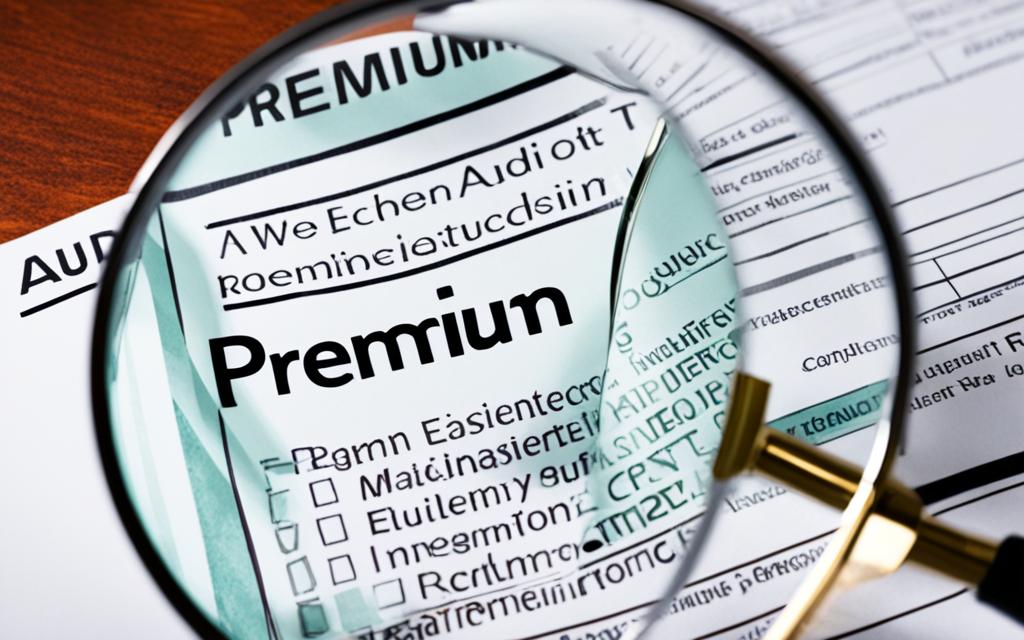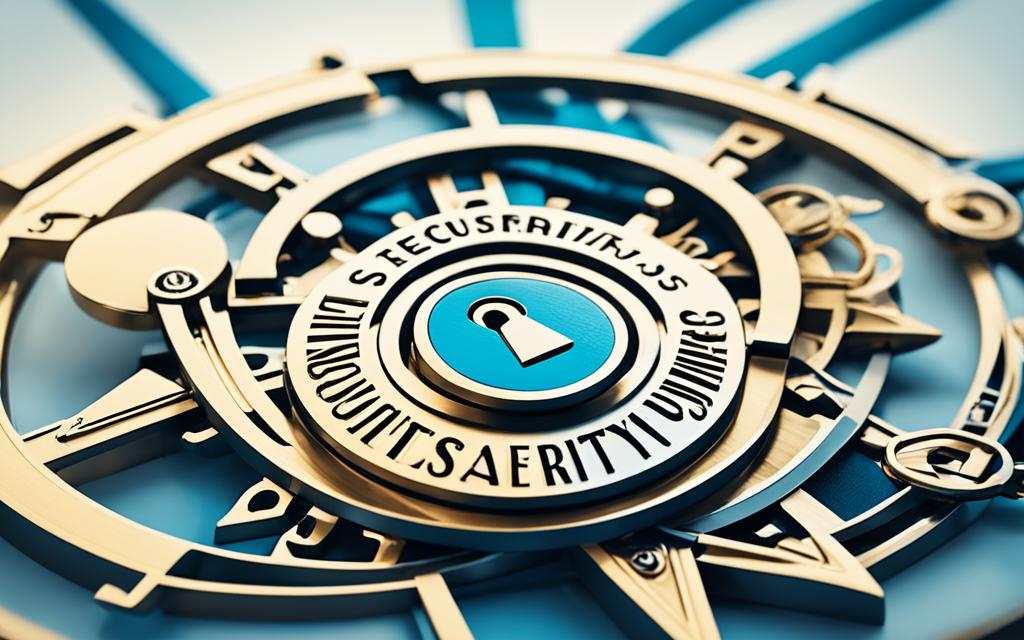It’s vital to protect your business with the right insurance. This includes commercial liability, property coverage, workers’ compensation, and more. A strong insurance plan can keep your company safe from many risks.1 Knowing your business insurance needs and getting the best coverage safeguards your operations. It protects against financial losses and any disruptions.2 This article shares important ideas and tips for finding the ideal insurance for your business.
Key Takeaways
- Comprehensive business insurance coverage is crucial for protecting your company against a variety of risks.
- Understanding your unique business insurance needs is essential for securing the right coverage.
- Commercial liability, property protection, and workers’ compensation are key elements of a robust insurance plan.
- Risk management strategies are crucial for safeguarding your operations from potential financial losses and disruptions.
- Tailoring your insurance package to your specific business needs can provide the coverage and peace of mind you need to focus on growth.
Introduction to Commercial Insurance
Running a business comes with many hurdles. One major step is investing in commercial insurance. This insurance protects your company from various unexpected events.3 These include property damage, business pauses, theft, and more.
The right commercial insurance can prevent your business from failing after a big loss. It helps you bounce back with minor disruptions.
Importance of Commercial Insurance
Commercial insurance has two key types: property and casualty. They both guard against many risks businesses face.4 Property insurance shields things like buildings and business materials. It also covers personal belongings of others.4 Casualty insurance is about liability, including insurances for workers, commercial vehicles, and general business responsibilities.
Common Losses Covered by Commercial Insurance
3 For example, general liability insurance pays for damage caused during business. Meanwhile,3 auto insurance covers company vehicles against damages and liability.3 If your business has employees, you need workers’ compensation. It handles their medical bills and time off due to work-related injuries.5 Property insurance protects against fire, theft, and more but not floods.5 General Liability Insurance takes care of injury or damage claims from others.5 Auto Insurance is for vehicles used by the company. It includes repair and replacement costs.
3 The cost of liability insurance is determined by your business’s income and past losses.3 Property insurance prices depend on your industry and building contents ownership.5 The expenses of business insurance change with variables like employee count, property, and the kind of work you do. To get the right coverage and price, talk to an insurance broker.
Purchasing Commercial Insurance
When starting to look for commercial insurance for your business, reach out to a licensed insurance broker-agent. These professionals focus on commercial coverages.4 Having a good broker-agent on your team is key, much like having an accountant or legal advisor.
Contacting a Broker-Agent
Your peers in business can guide you to a reliable commercial lines broker-agent.4 Additionally, consider reaching out to groups like the Insurance Brokers and Agents of the West. They can help you find a skilled broker in your area.4
Referral Sources for Broker-Agents
Networking and joining industry groups can lead you to a great commercial insurance broker-agent.4 Through these connections, you learn about different broker-agents’ skills and reputation. This knowledge helps you choose wisely when picking who to work with.1

Evaluating a Commercial Broker-Agent
Looking for a commercial insurance broker-agent is a big step. It’s crucial to check if they have a valid California Department of Insurance (CDI) license.6 This license lets a broker-agent sell commercial property and casualty insurance. The CDI says they must show their license at the office. Also, they need to put their license number on business cards, quotes, and ads.
Verifying Broker-Agent’s License
It’s key to know the difference between brokers and agents.6 Brokers work with many insurance firms and are hired by clients. On the flip side, agents work directly for insurance companies and earn commissions.7 For company owners, finding a trustworthy broker is vital. They help understand and lessen a company’s risks.
Understanding Broker vs. Agent Roles
7 A skilled broker can save entrepreneurs time. This is because looking into various insurance policies takes a lot of effort.7 Brokers offer advice, shedding light on insurance dealings. This helps companies reduce their risks smartly.7 Also, brokers can offer a range of plans from many insurance companies, which is a plus.
Types of Commercial Insurance Coverage
Commercial insurance has two main parts: commercial property insurance and commercial casualty insurance.8
Property Insurance
This insurance helps when property is lost, damaged, or ruined. It includes buildings, business personal property, and things owned by others. Main types are Commercial Property, Inland Marine, Boiler and Machinery, and Crime.8
Casualty Insurance
Casualty insurance deals with liability risks. It covers things like commercial automobile, commercial general liability, and workers’ compensation.8 An agent will show different coverage options based on your business’s risks.9
The Businessowners Policy (BOP) includes general liability, commercial property insurance, and business interruption coverage.10 Small businesses must have workers’ compensation. This insurance can prevent costly lawsuits from work injuries.10
Businesses might also need employment practices liability insurance (EPLI), cyber insurance, and more. These protect against specific risks they face.10
The cost of commercial insurance is called a premium. It’s what a business pays for protection.10

Business Insurance Needs
Finding the right business insurance is crucial. A broker-agent will look at your business closely. They’ll check your risks and your current insurance.
Then, they suggest the best insurance for you. This teamwork helps make sure your business is fully covered.
Knowing about different types of insurance is key. This helps you and the agent pick what’s best for you. It matches your business needs and risk plans.
Most small businesses get a business owner’s policy (BOP). It wraps up property, liability, and income coverage.11 General liability insurance pays for liability claims against the business.11 By law, businesses with employees need workers’ comp and unemployment insurance in many states.11 Disability insurance might also be needed, depending on the state.11
If a business is not insured, it might face huge costs alone. This could be very bad for its finances.11 Business income insurance helps when the business can’t run because of a disaster.11 Each industry needs its own special insurance kinds.11
For landscaping, off-site operations and pesticide insurance are important.11 Real estate might need special auto insurance and coverage for hiring practices.11 Retail can use a policy that helps if suppliers can’t work with you. And special upgrades.11 Restaurants might need special coverage for serving alcohol and if their refrigeration fails.11
As businesses grow, they should update their insurance too.11 This ensures they are always well protected.
Business insurance monthly costs are between $25 and $75 per policy. Rates depend on many things like where the business is, its size, and its industry.12
Factors Affecting General Liability Insurance Costs
General liability insurance costs depend on many things about your business and its risks. Companies look at these details to set the right prices for coverage. Let’s dive into what affects your general liability insurance cost.
Business Premises Size and Condition
Your business’s size and condition can change the insurance price. If you have a bigger space, you might pay more. This is because there’s a higher chance of injuries or damage.13
Class Code and Payroll
Your business’s class code, how much you pay your workers, and other factors are important. They decide your insurance costs. Insurers use this info to see how risky your business is, which affects what you pay.13
Business Operations and Industry
The type of work you do plays a big role in how much you pay for insurance. For example, construction companies often pay more. This is because their work is riskier. In comparison, professional services may have lower premiums,131415 enjoying cheaper insurance.13
Annual Business Revenue
How much money your business makes each year also matters. In riskier businesses, higher revenue usually equals higher insurance costs.1314
Experience in Profession or Field
How much you and your business know about your profession or field is crucial. Experienced businesses might pay less. This is because they’re often seen as less risky.
Number of Employees
If you have more employees, your insurance costs might go up. This is because more workers can mean more chances of accidents or damage. It leads to higher insurance prices.1314
Business Location
Where your business is located also affects insurance rates. If you’re in a place with high crime or a lot of traffic, you might pay more. This is because these locations have more risks.131415
Claims History
Your business’s past claims can change your insurance prices. Having previous claims might lead to higher quotes. Insurers see your business as riskier.13
Knowing these details helps you and your insurance agent find the right coverage. This can lower your insurance costs, tailoring them to your business’s specific needs.
Influencing General Liability Insurance Premiums
There are steps you can take to lower general liability insurance costs. Picking the right coverage limits and deductibles is key.13 Choosing higher limits means more protection but also higher costs. Yet, higher deductibles can reduce your monthly payments.13 Also, customizing your policy for your business can prevent you from overpaying.13 Lastly, bundling your insurance with other policies helps save money by combining coverages. This is where a business owner’s policy (BOP) can come in helpful.13
Choosing Limits and Deductibles
Picking the right coverage and deductibles is critical. More protection with higher limits means paying more.13 But, you can reduce costs by choosing higher deductibles. This means you pay more before the insurance helps, though.13
Tailoring Policy Coverage
Don’t just accept a generic liability policy. Work with your broker to match the policy to your actual business needs.13 This avoids paying for things you don’t need. It also ensures your business is fully covered.13
Bundling Policies
Combine general liability insurance with other commercial policies for savings.13 Bundling can get you lower premiums through discounts. It also makes managing your insurance easier.13
Premium Audits
During a commercial insurance premium audit, your financial records are checked. This is done to make sure your business’s insurance is right for its needs.16 Audits happen when a policy ends or if you cancel it.16 They’re vital for new and small businesses that often guess their finances. This helps adjust your insurance costs to match your business changes and risks.16
Premium audits are key in figuring out the final insurance cost.17 Details like payrolls and claims are sent to rating groups. They use this to figure out fair costs based on your business’s actual performance.17 These checks happen after a policy ends. They make sure you’re only paying for what you really used.17 The first payment was an estimate. The audit makes it the right amount based on what really happened.17
Things like payroll reports and insurance certificates might be needed for the audit.17 It’s good to have someone who knows the business work with the auditor. This can make sure everything is filed correctly.17 You should also ask the auditor questions and do a final check with them. This can help prevent errors and make the process smoother.17
Premium audits check the insurance and cost changes based on your actual business numbers.16 You might get money back if you overpaid. If you underpaid, you’ll owe more.16

Conclusion
It’s key to protect your business with the right business insurance. This ensures your business can keep going. Know why commercial insurance is crucial, how to buy the best coverage, and what affects your costs. Then, team up with a trusted broker to meet your exact business insurance needs.
A good insurance plan, from property and casualty insurance to liability protection, is crucial. It offers the stability and peace you need to grow your business. Make sure you’re getting the best coverage by being proactive. This way, you can deal with the ins and outs of commercial insurance. It will set your company up for success.
Want to protect your assets, handle risks, or bring in the best people? Then, having solid business insurance is a must. Work closely with an expert broker-agent to keep your insurance up to date. This ensures your coverage matches your changing needs and supports your business’s goals.
FAQ
What are the essential elements of a robust business insurance plan?
Why is purchasing the appropriate commercial insurance coverage crucial for a business?
How can a business owner find a reliable commercial insurance broker-agent?
What is the difference between a broker and an agent in the context of commercial insurance?
What are the two main categories of commercial insurance?
What factors does a broker-agent consider when determining the appropriate commercial insurance coverage for a business?
What factors can influence the cost of a business’s general liability insurance premium?
How can a business owner reduce the cost of their general liability insurance premium?
What is the purpose of a premium audit for commercial insurance?
Source Links
- https://www.thehartford.com/small-business-insurance/what-insurance-do-you-need-for-small-business
- https://www.businessnewsdaily.com/15781-types-of-business-insurance.html
- https://www.landesblosch.com/blog/commercial-insurance-101-an-introduction
- https://www.insurance.ca.gov/01-consumers/105-type/95-guides/09-comm/commercialguide.cfm
- https://tivly.com/commercial-insurance-101
- https://corporatefinanceinstitute.com/resources/career/commercial-insurance-broker/
- https://www.business.com/articles/looking-for-business-insurance-9-questions-to-ask-a-prospective-broker/
- https://www.thehartford.com/business-insurance/types-of-insurance
- https://www.nationwide.com/lc/resources/small-business/articles/what-are-the-different-types-of-commercial-business-insurance
- https://amtrustfinancial.com/blog/insurance-products/types-of-commercial-insurance
- https://www.thehartford.com/business-insurance/why-do-i-need-business-insurance
- https://www.legalzoom.com/articles/business-insurance-when-you-need-it-and-when-you-dont
- https://www.insureon.com/small-business-insurance/general-liability/how-premiums-are-calculated
- https://www.insurewithkevin.com/7-factors-that-influence-general-liability-insurance-premiums/
- https://www.farmers.com/learn/insurance-questions/what-determines-business-insurance-premiums/
- https://www.insureon.com/insurance-glossary/premium-audit
- https://amtrustfinancial.com/blog/agents/insurance-audit-process-101
- https://www.embroker.com/blog/do-i-need-business-insurance/
- https://www.linkedin.com/pulse/understanding-business-insurance-comprehensive-guide-richard-sweet




